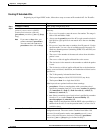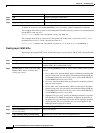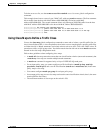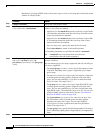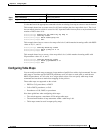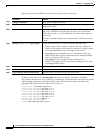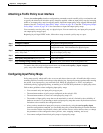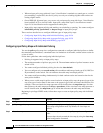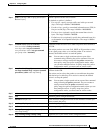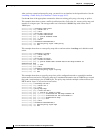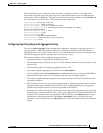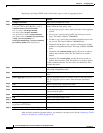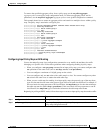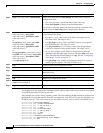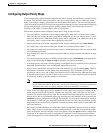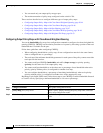
30-37
Cisco ME 3400 Ethernet Access Switch Software Configuration Guide
78-17058-01
Chapter 30 Configuring QoS
Configuring QoS
Step 4
police {rate-bps | cir cir-bps} [burst-bytes |
bc burst-bytes]
Define a policer for the class of traffic.
By default, no policer is defined.
• For rate-bps, specify average traffic rate in bits per second
(bps). The range is 8000 to 1000000000.
• For cir cir-bps, specify a committed information rate (CIR) in
bits per second (bps). The range is 8000 to 1000000000.
• For burst-bytes (optional), specify the normal burst size in
bytes. The range is 8000 to 1000000.
• For bc burst-bytes (optional), specify the conformed burst (bc)
or the number of acceptable burst bytes. The range is 8000 to
1000000.
Step 5
conform-action [set-cos-transmit
new-cos-value | set-dscp-transmit
new-dscp-value| set-prec-transmit
new-precedence-value | set-qos-transmit
qos-group-value | transmit]
(Optional) Enter the action to be taken on packets that conform to
the CIR.
The action can be to set a new CoS, DSCP, or IP precedence value,
to set a QoS group value, or to send the packet. If no action is
entered, the default action is to send the packet.
Note You can enter a single conform-action as part of the
command string following the police command. You can
also enter a carriage return after the police command to
enter policy-map class police configuration mode, where
you can enter multiple actions. In policy-map class police
configuration mode, you must enter an action to take.
Step 6
exceed-action [drop | [set-cos-transmit cos |
set-dscp-transmit dscp | set-prec-transmit
precedence [table table-map name]]
(Optional) Enter the action to be taken for packets that do not
conform to the CIR.
The action can be to drop the packet or to mark down the packet
with the help of a table map. If no action is entered, the default
action is to drop the packet.
Note You can enter a single exceed-action as part of the command
string following the police command. Or you can enter a
carriage return after the police command to enter
policy-map class police configuration mode, where you can
enter multiple actions. In policy-map class police
configuration mode, you must enter an action to take.
Step 7
exit Return to policy-map configuration mode.
Step 8
exit Return to global configuration mode.
Step 9
interface interface-id Enter interface configuration mode for the interface to which you
want to attach the policy.
Step 10
service-policy input policy-map-name Attach the policy map (created in Step 2) to the ingress interface.
Step 11
end Return to privileged EXEC mode.
Step 12
show policy-map [policy-map-name [class
class-map-name]]
Verify your entries.
Step 13
copy running-config startup-config (Optional) Save your entries in the configuration file.
Command Purpose



